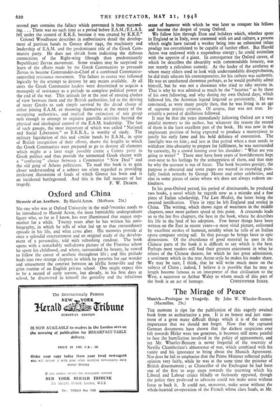Oxford and China
Memoir of an Aesthete. By Harold Acton. (Methuen. 21s.)
No one who was at Oxford University in the mid-'twenties needs to be introduced to Harold Acton, the most formidable undergraduate figure who, so far as I know, has ever illuminated that august step- mother for a while. Twenty years after he has written his auto- biography, in which he tells of what led up to that extraordinary episode in his life, and what came after. His memoirs provide at once a splendid entertainment and an original study of the develop- ment of a personality, told with refreshing candour. The book opens with a remarkably well-drawn picture of the Florence where he spent his childhood, and where, surrounded by beauty, he vowed to follow the career of aesthete throughout life ; and this prelude leads into two strange chapters in which he presents for our wonder and amusement the contrast between an idyllic home-life and the grim routine of an English private school. One might expect this to be a record of early sorrow, but already, in his first days at school, he discovered in himself the geniality and the infectious
sense of humour with-which he was later to conquer his fellows and become the despot of young Oxford.
We follow him through Eton and holidays which, whether spent in England or in Italy, were crammed with art and culture, a process which might have turned a weaker being into an exhausted infant prodigy too overstrained to be capable of further effort. But Harold Acton was endowed with a stupendous energy ; he could assimilate with the appetite of a giant. In consequence the Oxford career, of which he describes the absurdity with commendable honesty, was not merely a ridiculous comedy. As the leader of the aesthetes at whom many elders used to look with understandable disapprobation, he did truly educate his contemporaries, for his culture was authentic. He was an unashamed showman perhaps, as he would probably admit himself, but he was not a showman who tried to take anyone in.
That is why he was admired as much by the " hearties " as by those of his own following, and why during my own Oxford days, which
followed his, the Actonian legend lingered so persistently. He was convinced, as were many people then, that he was living in an age of supreme artistic creation. Of course, that was not true. In- evitably a period of disillusion followed.
It may be that the years immediately following Oxford are a very painful memory to the author, but whatever the reason the record of them is the least excellent part of the book., He was now in the unpleasant position of being expected to produce a masterpiece to justify his early fame and his bold defiance of convention. The limelight was on him ; and just at that period when a man needs to withdraw into obscurity to prepare for fulfilment, he was surrounded by curiosity, by a crowd leaning over his shoulder: " What are you going to write? " These may have been years of bewilderment kept over-near to his feelings by the unhappiness of them, and that may be why the account is out of focus. The book becomes gossipy, the purpose is obscured and some pages are wasted in recording pain- fully foolish remarks by George Moore and other celebrities, and also in some pieces of satire where wit does not always redeem un- kindness.
In his post-Oxford period, his period of diminuendo, he produced two books, a novel which he regards now as a mistake and a fine piece of Italian scholarship, The Last Medici, the latter being the awaited justification. Then in 1932 he left England and settled in China. The writing, which shows signs of weariness in the middle chapters, once more gathers speed at this point. A crescendo leads us to the last five chapters, the best in the book, where he describes his life in the land of his adoption. Few better things have been written on the East in recent years—a most vivid picture, enlivened by excellent strokes of humour, notably when he tells of an Italian opera company setting. sail. In that passage he brings farce to epic dimensions. Of the abundance of good material he uses in the Chinese parts of the book it is difficult to say which is the best. Perhaps most readers will find their greatest enjoyment in what he relates of the Chinese theatre, for which he has great admiration, a sentiment which in the true Acton style he makes his reader share. We may be sure, I think, that he will write much more on the subject of China ; indeed, I believe it is possible that he may at length become famous as an interpreter of that civilisation to the West, a successor to Arthur Waley to whom much of this part of


































 Previous page
Previous page